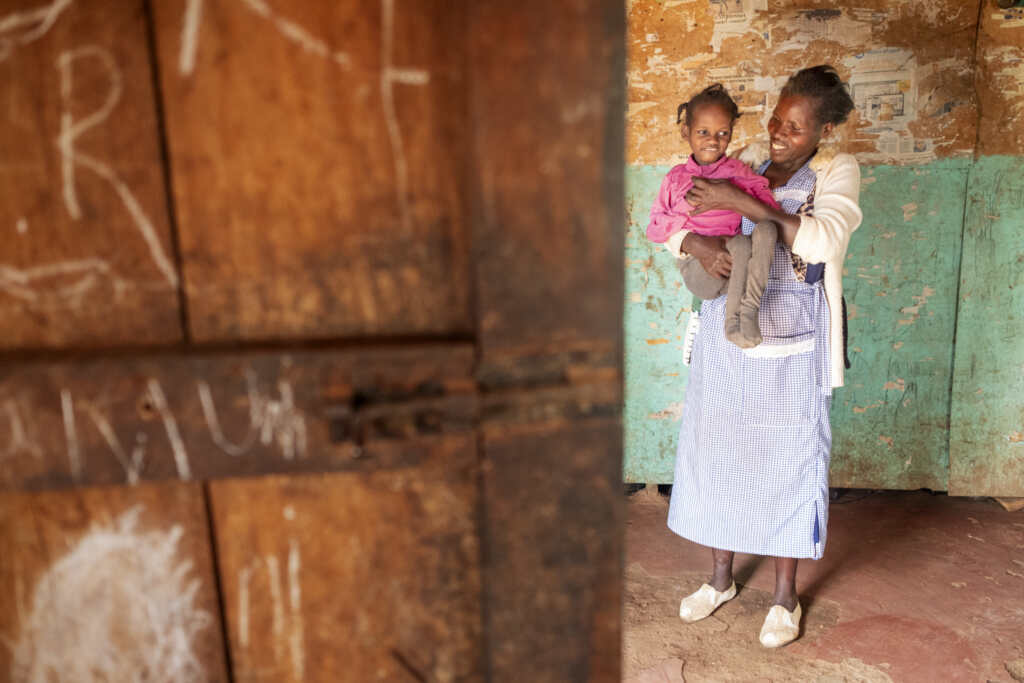
“I am never comfortable when I am away,” confesses Cecilia Kinya. Cecilia, 43, is the sole breadwinner for the family of six and her second youngest, Risper, is deaf-blind. Risper, 10, had meningitis as an infant and lost her vision and hearing as a result. “Risper is entirely dependent on me,” says Cecilia.
But most every day she has to leave Risper in the bed of their house, which is made of warped plywood sheets and old tarpaulins, and hopes for the best as she heads to the Muthara market, where she sells vegetables. Years of malnutrition have left their mark on Risper, who is the size of a toddler and can’t move around on her own. “I am not sure how to manage this situation,” Cecilia confesses.
Cecilia has joined the local Organization of Persons with Disabilities (OPD) which is part of the MERU Inclusive Trachoma Wash-plus Project (MINT) Project implemented by the Diocese of Meru (DOM).
“I’ve benefitted a lot from the group,” Cecilia says. The OPD group has been an important source of comfort and information for Cecilia, who didn’t have any information on caring for a deaf-blind child. “It is not easy to raise a child who can not see or talk.”
Through the OPD’s connection to the MINT project, Risper has also been provided with fortified porridge and has been identified by the Diocese of Meru (DOM) as requiring physiotherapy and assistive devices, such as a standing frame. “Body-wise she has improved. She was weak and feeble now she will be stronger and probably walk!”
The OPD also has a Savings and Internal Lending (SILC) component, which Cecilia uses to buy wholesale vegetables to re-sell at the local market.
Cecilia begins to talk about the loans she takes: “The little money we get from the small loans…” She stops mid-sentence, the weight of all the burdens she carries is evident on her face. “It’s survival,” she finally says. “I am only foreseeing trouble. We are likely to go hungry.”
Meru county has been severely impacted by drought and a half-acre of beans whose seeds were procured through the OPD are now wilted and yellow, dying on the hillside next to the small house. “Even if it rains now there is not much we can salvage – the crops are gone. It’s only fodder for livestock.”
Without the connection to the OPD, Risper and her family would have remained entirely hidden and unsupported.
It’s cases like this that highlight the value of the MINT project, says Kennedy Muthania, Spark coordinator at the DOM. “That is the uniqueness of MINT. If you have a bedridden child, your needs are conflicted. How can you do water, sanitation & hygiene when your child is bedridden? It’s like telling a hungry person they need a balanced diet while they are dying,” says Kennedy.
“You find someone and they have lost hope and you give them the hope to keep living. You have to restore their dignity … then they can listen to you about WASH. The idea of MINT is to look as broadly as possible and ask ‘how does this help the most vulnerable,’ ” says Kennedy.
“The program is unique in that although we are looking at WASH and trachoma, we are making sure no one is left behind. It’s about the vicious cycle of poverty – the poorer you are the more likely you are to be disabled and vice versa.” The programme has already changed many lives but it has challenges too, says Kennedy. “The needs are many and the resources are limited.”
The MINT project has encountered many people with disabilities like Risper, who were “hidden” and in need of devices and physiotherapy. Few people can afford devices and travel costs for treatment, says Kennedy, and funding is limited.
“No major players are interested in disability because there is no quick impact. It is protracted, long term work. It can take years to see results.” But for Kennedy, the work, no matter how slow moving it is, he knows it has been worthwhile. “If you meet a person with disabilities in Meru county who is slightly well off, they must have passed through the Diocese in one way or another.”
